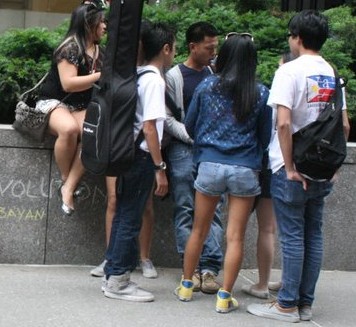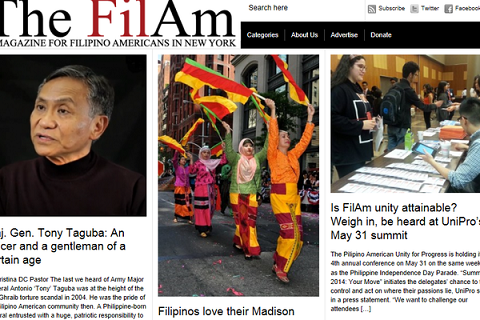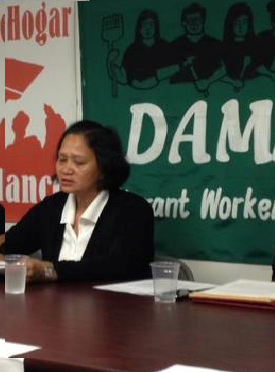Trafficked maid wins settlement against diplomat, allowed to stay in U.S.
Deadema ‘Dema’ Ramos narrated her harrowing experience which began in 2009 when she arrived in New York City with her employer, a Kuwaiti diplomat assigned to the UN mission. On arrival, the diplomat confiscated her passport and confined her to the house.
Dema said she was forced into often backbreaking work seven days a week, 20 hours a day, for as little as $400 a month, most of which was sent to the Philippines to support her five children. She said she got very little rest and not enough to eat and, she lost a lot of weight.
“I want people to realize that this is really happening here in America to domestic workers,” said Dema at a September 13 press conference organized by Damayan and the Community Development Project at the Urban Justice Center. She said she steeled herself against the physical and psychological abuse because she needed the job to support her family in the Philippines.
She also alleged the diplomat made her sign documents she was not allowed to read, restricted her movements and kept her hostage through fear and manipulation. Nearly a year after arriving in New York, Dema met a Filipina who gave her the phone number of Damayan, a grassroots organization advocating for the rights of low-wage Filipino migrant workers. Damayan helped Dema escape, and two years later she is one of Damayan’s most active organizers.
With the representation of attorneys from the Community Development Project at the Urban Justice Center, Dema sent a demand letter to the diplomat, threatening to file suit if he did not pay Dema the wages she was owed. The diplomat recently agreed to a settlement. Dema applied for immigration status as a trafficking victim and was approved.
Trafficked domestic workers experience some of the most inhumane forms of labor exploitation, yet some traffickers are the same diplomats who claim to uphold human and labor rights, according to a joint Damayan-UJC statement. The most recent data from the Government Accountability Office found 42 documented cases of abuse of domestic workers by diplomats between 2000 and 2007, and the U.S. State Department’s 2011 and 2012 Trafficking in Persons Reports cited well over a dozen allegations in the reporting period, including civil lawsuits and criminal investigations of diplomats. These numbers are widely believed to be underreported, because of the isolation of domestic workers and the difficulty in reporting the crime.
“This legal settlement is proof that trafficking victims can win justice, even when the trafficker is a diplomat,” said Nicole Hallett, staff attorney at the Urban Justice Center’s Community Development Project. “Diplomats can no longer hide behind diplomatic immunity to abuse their workers.”
Roughly 4,300 Filipinos leave their country every day; 90 percent of them are women, and 70 percent become domestic workers in countries like the U.S. There are over 200,000 domestic workers in NYC, 15 percent of whom are Filipinos, according to the Damayan-UJC statement.
“Many, like Dema, are trafficked, meaning they are brought to the country through fraud, force, or coercion of other kinds,” said Damayan which is in the midst of a campaign to bring these women out of the shadows while demanding accountability for traffickers.













[…] By Voices of NY | The FilAm Go to original story No […]